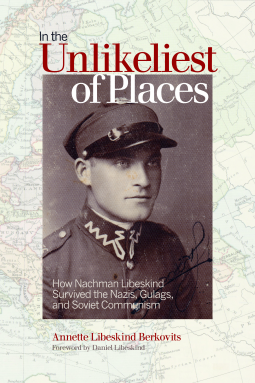
In the Unlikeliest of Places
How Nachman Libeskind Survived the Nazis, Gulags, and Soviet Communism
by Annette Libeskind Berkovits
This title was previously available on NetGalley and is now archived.
Send NetGalley books directly to your Kindle or Kindle app
1
To read on a Kindle or Kindle app, please add kindle@netgalley.com as an approved email address to receive files in your Amazon account. Click here for step-by-step instructions.
2
Also find your Kindle email address within your Amazon account, and enter it here.
Pub Date Sep 05 2016 | Archive Date Oct 07 2016
JKS Communications | Wilfrid Laurier University Press
Description
Annette Libeskind Berkovits thought her attempt to have her father record his life's story had failed. But three years after her father's death, she was going through his things and found a box of tapes—several years' worth—with his spectacular life, triumphs, and tragedies told one last time in his baritone voice.
Nachman Libeskind's remarkable story is an odyssey through crucial events of the twentieth century. With an unshakable will and a few drops of luck, he survives a pre-war Polish prison; witnesses the 1939 Nazi invasion of Lodz and narrowly escapes; is imprisoned in a brutal Soviet gulag where he helps his fellow inmates survive, and upon regaining his freedom treks to the foothills of the Himalayas, where he finds and nearly loses the love of his life. Later, the crushing communist regime and a lingering postwar anti-Semitism in Poland drive Nachman and his young family to Israel, where he faces a new form of discrimination. Then, defiantly, Nachman turns a pocketful of change into a new life in New York City, where a heartbreaking promise leads to his unlikely success as a modernist painter that inspires others to pursue their dreams.
With just a box of tapes, Annette Libeskind Berkovits tells more than her father's story: she builds an uncommon family saga and reimagines a turbulent past. In the process she uncovers a stubborn optimism that flourished in the unlikeliest of places.
Available Editions
| EDITION | Other Format |
| ISBN | 9781771122481 |
| PRICE | $24.99 (USD) |
Average rating from 7 members
Featured Reviews
 Reviewer 201788
Reviewer 201788
There have been many extraordinary stories to come from those who survived the Holocaust. Each is a little bit different, a little surprising in its own way. There’s so much to be learned about human nature, both the good and the bad of it, from personal histories like these. Nachman Libeskind’s story is unique for his strong belief in the goodness of people, and the ways he demonstrates that goodness in himself.
This memoir traces his family’s life in prewar Poland, his military service, time in a Soviet gulag and as a refugee in Central Asia, up to rebuilding his postwar life with his own family and immigration to Israel and the United States. In New York City, at close to fifty years old he learns English and throws himself into integration in American life. His daughter, Annette Libeskind Berkovits, who made a name for herself as head of science education programs at the Wildlife Conservation Society, lovingly and carefully tells his life story based largely on a collection of tapes her father recorded of himself telling these tales.
This oral history was coupled with her own research to give historical and cultural context and insight, as well as her lifetime of memories with her family. It’s a lot of information, but it works beautifully and the story evokes a range of emotions – her father is a genuinely charming, warm person whose observations are adorable and sweetly humorous, but there are passages that bring you to tears too. (And then an entertaining Hillary Clinton anecdote to make you happy again! It’s kind of a roller coaster.)
It helps that Berkovits is a gifted storyteller, and her writing makes for smooth reading. That wasn’t an easy task, because as she points out in the book’s introduction, she chose to jump between the past and the present in the narrative of her father’s life, loosely connecting events or recollections or ideas, mimicking the flighty way memory itself functions. It turns out to be an affecting choice, and it’s very well done as I didn’t find myself getting lost in the jumps at all. In fact, she really achieved her goal of writing a book that captures the fleeting nature and changing abilities of memory.
So how did he survive some of the most horrific events of the 20th century, as the subtitle says? Through kindness. Treating others well. Understanding instead of anger. Patience. Trying again, always while staying positive. But the main theme here, and what Berkovits said in an interview that she most wanted to be remembered about her father’s legacy, is that “…one must never forget history, but at the same time one absolutely cannot harbor bitterness that keeps one from moving forward in a positive way. My father always looked for the best in people he met. He felt strongly that everyone has something valuable to offer the world.” What an incredible gift he left when he made those tapes, and how amazing that she shared something so valuable with the rest of the world.
As an added point of interest, even if you’re not an architecture aficionado, the name Libeskind surely rings a bell. Daniel Libeskind is the architect responsible for such well-known and much-discussed structures as the Jewish Museum Berlin and the World Trade Center Master Plan, among many others. He’s Nachman’s second child; his heartfelt foreword to his sister’s book is fitting and a beautiful read too. It’s easy to see how a father who worked so hard, rebuilding his life almost completely anew multiple times over the course of living it, and who had such a passion for the arts, humanities, and contributing to the world in a kind, meaningful way, left as his legacy two children who’ve done just that – given a lot of rich, thoughtful art and meaningful work to the world.







